- Home
- Terry C. Johnston
Lay the Mountains Low Page 2
Lay the Mountains Low Read online
Page 2
—JEROME A. GREENE
The U. S. Army and the Nee-Mee-Poo Crisis of 1877
If Howard had been as bold [at the Clearwater] as General Gibbon [was at the Big Hole] we might have been all taken, although we intended to fight to the last.
—WHITE BIRD
The Battle of the Clearwater was indisputably a watershed in the army’s campaign against the Nez Perces. By not pressing them in their retreat from the village, General Howard lost both the initiative and an opportunity to finally curb the non-treaty Nez Perces and end the war.
—JEROME A. GREENE
In retrospect, the Nez Perces’ parochial perspective of the war, and their insensibility to comprehending the scale and span of the United States government’s resistance to [their flight from their homes in Idaho Territory to the Big Hole in Montana Territory], became key ingredients in their ultimate tragedy.
—JEROME A. GREENE
AUTHOR’S FOREWORD
BEFORE YOU BEGIN READING THIS BOOK, I WANT YOU TO take a moment to consider that the story you hold in your hands is entirely true.
While I’m sure you realize that I have constructed dialogue from a myriad of historical documents to make this story leap off the page with a sense of immediacy, I have striven to capture each person’s individual character in their manner of speech. Rest assured that I haven’t fabricated a single one of the scenes that follow this introduction. Every incident happened when and where and how I have written it. Every one of the characters you will come to know actually lived, perhaps died, during these pivotal weeks during the Nez Perce War of 1877.
After my previous fourteen Plainsmen novels, millions of you already have an abiding faith in me, a belief that what you’re going to read is accurate and truly authentic.
But for those of you thumbing through your first Terry C. Johnston book, let me make this one very crucial promise to you: If I show one of these fascinating historical characters in a particular scene, then you’d best believe that character was there—when it happened, where it happened. I promise you, despite the overwhelmingly popular and politically correct notions long held by most people, this is how the tragedy of the Nez Perce War did unfold.
Truth is, I could have written a book nearly twice as long as this if I had explored the complex historical background of the old treaties and how they were broken after gold was discovered deep in Nez Perce country, if I had begun reciting in chapter and verse all the intrusions by whites where they were not allowed by the early treaties, relating to you that seductive lure of alcohol and firearms on the young warriors; writing of the rapes and murders committed against those Nez Perce bands helplessly watching as their old way of life was trampled underfoot right before their eyes, not to mention the government’s feeble efforts to keep a lid on each deplorable incident after the fact.…
But, for all that detailed background I didn’t cram into these three novels I’m writing on the Nez Perce War, the reader can learn every detail he or she wants to know in the following books:
I Will Fight No More Forever, by Merrill D. Beal
The Flight of the Nez Perce, by Mark H. Brown
The Nez Perce Tribesmen of the Columbia Plateau, by Francis Haines
The Nez Perce Indians and the Opening of the Northwest, by Alvin M. Josephy, Jr.
As for my story—beginning with the outbreak of the war as I told it in Cries from the Earth—I dispensed with all that oft-confusing historical background because you can learn it far better elsewhere … and because I prefer to plop you right down into the middle of this tragic conflict.
As you are drawn back in time and reading the pages of my story, you may well wonder: What are these brief news articles that appear here and there at the beginning of certain chapters or scenes? Keep in mind that those clippings aren’t the fruits of my creative imagination. Rather, they are ripped right from the front pages of the newspapers read by living, breathing people in that summer of 1877.
One more sidelight before you start what will surely be one of the most fascinating rides of your life—the letters that Emily FitzGerald, wife of surgeon John FitzGerald, writes home to her mother from Fort Lapwai are real, too. Transcribed verbatim for you, every last word of those letters make them simple, heartfelt messages from a woman who finds herself trapped squarely at ground zero, right in the middle of an Indian war.
I hope Emily’s letters, along with those timely newspaper clippings, will lend an air of immediacy to this gripping tale that every other book on the Nez Perce War has not.
As you make your way through this story, page by page, many of you might start to worry when you find this tale missing our intrepid Irishman, Seamus Donegan. Be strong of heart! In the next volume—The Broken Hoop—Seamus; his wife, Samantha; and their son, Colin, will migrate from Fort Laramie in the spring of 1877, making their way north to Fort Robinson, where they will find themselves on center stage for the last months of Crazy Horse’s life. When his old friend Colonel Nelson A. Miles marches his Fifth U. S. Infantry north from Tongue River in pursuit of the Nez Perce fleeing for Canada (that third and final act in this tragedy), the Irishman will be along … as a brutal winter storm and the army descend upon the Bears Paw Mountains—catching the Non-Treaty bands just forty miles short of the Old Woman’s Country,
As you saddle up and begin this ride with me, I want to remind you that every scene you are about to read actually happened. Every one of these characters was real—and they were there to walk that hallowed ground … to live or die in what fading glory still belonged to the Nez Perce in a damned and dirty little war.
I couldn’t have made up this remarkably intricate and tragic story if I’d tried. I simply don’t consider myself that good a writer.
Contents
Prologue
Chapter One
Chapter Two
Chapter Three
Chapter Four
Chapter Five
Chapter Six
Chapter Seven
Chapter Eight
Chapter Nine
Chapter Ten
Chapter Eleven
Chapter Twelve
Chapter Thirteen
Chapter Fourteen
Chapter Fifteen
Chapter Sixteen
Chapter Seventeen
Chapter Eighteen
Chapter Nineteen
Chapter Twenty
Chapter Twenty-One
Chapter Twenty-Two
Chapter Twenty-Three
Chapter Twenty-Four
Chapter Twenty-Five
Chapter Twenty-Six
Chapter Twenty-Seven
Chapter Twenty-Eight
Chapter Twenty-Nine
Chapter Thirty
Chapter Thirty-One
Chapter Thirty-Two
Chapter Thirty-Three
Chapter Thirty-Four
Chapter Thirty-Five
Chapter Thirty-Six
Chapter Thirty-Seven
Chapter Thirty-Eight
Chapter Thirty-Nine
Chapter Forty
Chapter Forty-One
Chapter Forty-Two
Chapter Forty-Three
Chapter Forty-Four
Chapter Forty-Five
Chapter Forty-Six
Chapter Forty-Seven
Chapter Forty-Eight
Chapter Forty-Nine
Chapter Fifty
Chapter Fifty-One
Chapter Fifty-Two
Chapter Fifty-Three
Chapter Fifty-Four
Chapter Fifty-Five
Chapter Fifty-Six
Chapter Fifty-Seven
Chapter Fifty-Eight
Chapter Fifty-Nine
Chapter Sixty
Chapter Sixty-One
Chapter Sixty-Two
Chapter Sixty-Three
Chapter Sixty-Four
Chapter Sixty-Five
Chapter Sixty-Six
Chapter Sixty-Seven
Epilogu
e
Author’s Afterword
About the Author
PROLOGUE
20 JUNE 1877
CURSING THE RISING SUN UNDER HIS BREATH, FIRST SERgeant Michael McCarthy ground the heels of both hands into his gummy, crusted eyes.
Already this morning the little settlement of Grangeville was slowly stirring—not just those soldiers and civilians who stood watch at the barricades for the approach of Joseph’s Nez Perce warriors, but those men rekindling fires, women stirring up breakfast, and even the few children adding their cheery, innocent voices to the coming of this new day.
Squinting overhead, the Canadian-born McCarthy found a clearing sky. Far better than the low, leaden clouds that had hovered above them almost from the moment Captain David Perry had led them out of Fort Lapwai after the marauding Non-Treaty bands.
Perry. Just thinking about the man made McCarthy hawk up the night-gather clinging at the back of his throat. Now there was a coward weighed down beneath a captain’s bars! There wasn’t a goddamned reason they should have left more than a third of their command down in that valley of White Bird Canyon. A good officer, a brave commander, could have seized control of those wavering troopers, halted their wild retreat before it ever got started….
The thirty-two-year-old soldier hung his head and took a deep breath as he clenched his eyes shut. McCarthy remembered—doubting he ever would forget—the sights he had left behind him on that battleground. Last man out that he was. The last to crawl up the 3,000 feet of White Bird Canyon … the valley floor behind him littered with dead and wounded comrades, swarming with Nez Perce horsemen like an attack of summer wasps boiling out of their nest.
Perry had gone and jabbed a big stick right into that nest. And when there was nothing left for any of them to do but turn about and high-tail it back up the canyon wall, Captain David Perry was powerless to control the panic. Damn, but Michael) couldn’t blame those poor enlisted weeds: Why would any of them want to stop, turn around, and start fighting anew for a commander like David Perry? Not when the captain had marched his bone-weary men down through the dark toward an enemy no one knew a god-blame-it thing about, every one of his hundred soldiers riding too-tired and ill-fed horses.
“They wasn’t ready to fight,” he grumbled under his breath now as he dragged over the first brown boot. For a moment he caressed the soft, saddle-soaped texture of the tall, mule-eared boot top. God bless sutler Rudolph, he thought. Godbless’im, Lord.
The afternoon after First Sergeant Michael McCarthy had been discovered and brought in by those two civilian volunteers from out near Johnson’s ranch, near halfway between the White Bird divide and the settlement of Grangeville, Rudolph had graciously presented McCarthy with a pair of real leather boots to take the place of those ill-fitting rubber miner’s boots the sergeant had discovered in an abandoned cabin on his way over the divide to the Camas Prairie. Once more, Michael knew how the Lord doth provide!
Left behind by the rest of those hardy old files bringing up the rear of the frantic retreat, McCarthy had lain there on the slope, playing dead until the screaming warriors thundered past. Only then did he quickly roll into the willow and wild rose lining the banks of White Bird Creek, slipping into the water so that only his head was showing there beneath the low-hanging brush. After waiting out the comings and going of the warriors searching for any wounded soldiers and looting the bodies of his poor dead comrades, it was no wonder the icy-cold water had soaked his regulation boots through and through. Soles falling away from lasts, stitches unraveling. Utterly worthless: just like near every other piece of equipment this god-blame-it army gave its soldiers to use. Boots that never would get him up that slope he had studied from between the leafy willow—only to find that he’d been discovered by a fat Indian squaw riding past on her pony.
How his heart had frozen when the fat one called over an old man—pointing to the clump of willow where McCarthy lay hidden. He had pulled out his service revolver and prepared to take as many of them with him as he could before he was killed. But … search as he did, the old man didn’t spot him. He rode off with the woman.
In the quiet where he could hear his own heart surging in his ears, McCarthy quickly tore off his campaign hat, slipped out of his navy blue fatigue blouse with its telltale gold stripes. If he’d dared to tug off his light blue wool britches with their wide brassy stripe running down the outside … but he knew he would need them in his run for freedom. Wasn’t no man going to make it to the settlements near naked!
Besides the gift of those knee-high boots, sutler Rudolph had presented the sergeant with a pair of leather gloves and a new felt hat—gray as the skies had been the last three days.
“You’re a honest-to-God hero,” Rudolph had announced to the crowd when he presented his gifts to the newly arrived McCarthy. “All you soldiers are heroes to us!”
And then the gathering of some forty men, women, and children huddled behind an upright stockade, which they had erected right around Grange Hall, huzzahed as if they had just been delivered from the hoary grip of death itself. Just the way Michael McCarthy had been scooped up by some angel and carried out of that valley of death, deposited at the top of White Bird divide, where he made three wrong turns and ended up wandering the heights for far longer than he should have.
When those two soldiers brought the ravenous McCarthy to the barricades, his nose caught the whiff of an enticing perfume. Someone had beans on the boil. “White dodgers!” he had exclaimed as he vaulted off the back end of that tired cavalry horse, lumbering across the breastworks for that seductive pot. First things first. He’d look for familiar faces from his H Company once his belly was full. Enough time to make reacquaintance with his weeds what made it out of that Injun fight with their hides intact.
“Sweet, sweet Joseph and Mary,” he murmured again, clenching his eyes as he rocked onto his knees, preparing to roll up his blankets. Would he never forget the sight of Corporal Roman D. Lee being dragged from his horse, the entire front of his blue britches turned black with blood gushing from that bullet to the groin? Would he ever be able to blot out the nightmare of watching Lee stumble away from his handlers like a drunken sailor newly arrived on dry land, wandering off into that milling, confusing, maddening maze of confused men and frightened horses? Would he never be rid of watching the corporal unknowingly weave and lunge on down that emerald grassy slope—right for the enemy’s lines?
At sundown each of the last two nights, Second Lieutenant William Russell Parnell had come whistling up the company, calling out men to post a rotation for night guard. Too much darkness, too much quiet, too damned much time each night on watch … time alone to think and remember.
He took a deep breath and pushed an unruly lock of his dark auburn hair from his eyes, telling himself such haunting was the lot of a soldier. Be he an Irishman like McCarthy or one of those pig-swilling Germans, a soldier was bound to lose friends. Maybeso, it wasn’t a good thing for a sergeant to have him any friends. Only officers above him and enlisted boyos below. Maybe there was a damned good reason officers never talked to their weeds—communicating only through the noncoms like McCarthy. That way an officer didn’t have to care who was thrown into the fray, who would never ride back with the company.
When McCarthy gave orders to H Company, it was with a voice still very thick with that Newfoundland Irish heritage of his. As soon as he was old enough to leave home and strike out on his own, McCarthy had wandered south from Canada, spending a short time in Vermont before migrating down to Boston. In that good Irish town he had knocked around a bit before he landed steady work as a printer’s devil. A year later when the Civil War broke out, he was only fifteen—too young to enlist, having to content himself by following the war with every new edition or extra of the Boston paper.
By the time the Southern states had been defeated and herded back into the Union fold, McCarthy had wearied of the acrid stench of printer’s ink etching every wrinkle and crevice of his h
ands, chuffing down the street to inscribe his mark on a five-year enlistment. Sending him west to Jefferson Barracks near St. Louis, the army trained him to be a horseman, then promptly shipped him off to a First Cavalry outfit down near the Mexican border to fight Apaches. Wasn’t long before they transferred McCarthy, now wearing a corporal’s stripes, along with some of his mates, all hustled north to Oregon country, where they ended up chasing half a hundred poor Modocs around and through the Lava Beds for the better part of a year.
Fact was, McCarthy had been in on the chase and capture of the Modoc leader, Captain Jack. A heart-wrenching tragedy that was, McCarthy thought many times since—how the chief’s friends, advisers, and headmen had all turned on him. Sad, too, that most of those back-stabbing traitors went free while Jack swung at the end of a short rope.
He smelled tobacco all of a sudden. McCarthy glanced at the knot of men gathered on their haunches around a small fire, most of their number smoking their first bowl of the day. His heart seized with the sudden recollection of their blind descent into the valley of the White Bird behind Perry, ordered to halt and wait until it was light enough to make their advance on the village. Up and down the ranks of those two companies, five officers, and more than a dozen Nez Perce friendlies conscripted as trackers the order was given that no pipes be lit.
Later, as the horses snuffled and the men grumbled every time they were nudged to keep them awake in the cold, damp darkness, McCarthy spotted the bright, minute flare of the sulphur-headed lucifer. The sergeant had bounded over, ready to throttle and choke the stupid weed who was trying to light his goddamned pipe.
The match had flared for but the space of three heartbeats before McCarthy got it extinguished. Then thought nothing more of it until they all heard the off-key, muffled call of a coyote. Its eerie, echoing cry had raised the reddish hair on the back of his neck. A few of the old files had known right then what was in store for them come first light.

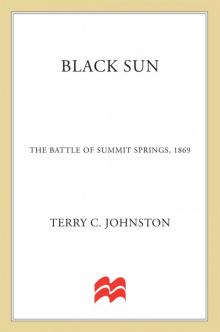 Black Sun, The Battle of Summit Springs, 1869
Black Sun, The Battle of Summit Springs, 1869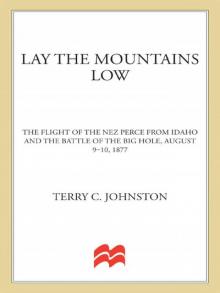 Lay the Mountains Low
Lay the Mountains Low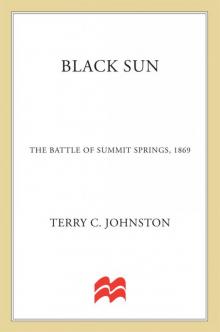 Black Sun: The Battle of Summit Springs, 1869 (The Plainsmen Series)
Black Sun: The Battle of Summit Springs, 1869 (The Plainsmen Series)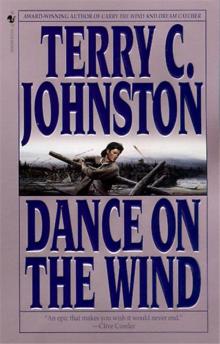 Dance on the Wind tb-1
Dance on the Wind tb-1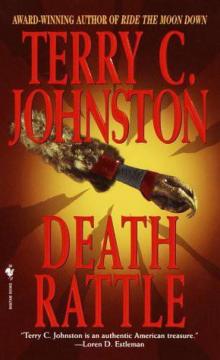 Death Rattle tb-8
Death Rattle tb-8 The Stalkers
The Stalkers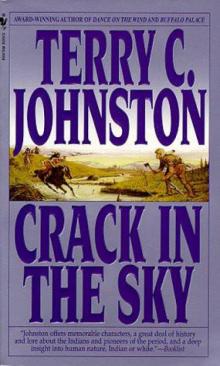 Crack in the Sky tb-3
Crack in the Sky tb-3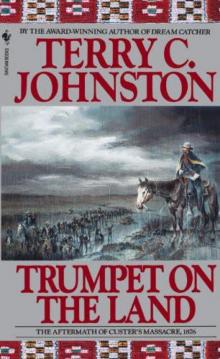 Trumpet on the Land: The Aftermath of Custer's Massacre, 1876 tp-10
Trumpet on the Land: The Aftermath of Custer's Massacre, 1876 tp-10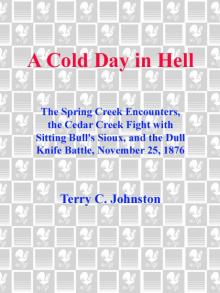 A Cold Day in Hell
A Cold Day in Hell Long Winter Gone: Son of the Plains - Volume 1
Long Winter Gone: Son of the Plains - Volume 1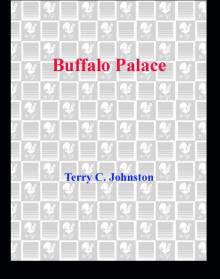 Buffalo Palace
Buffalo Palace Cries from the Earth
Cries from the Earth Death Rattle
Death Rattle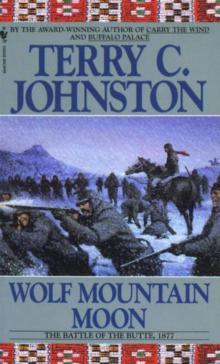 Wolf Mountain Moon: The Battle of the Butte, 1877 tp-12
Wolf Mountain Moon: The Battle of the Butte, 1877 tp-12 Crack in the Sky
Crack in the Sky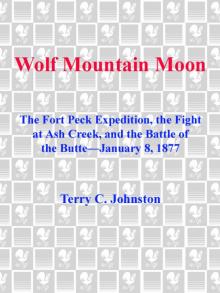 Wolf Mountain Moon
Wolf Mountain Moon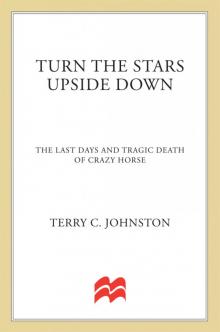 Turn the Stars Upside Down: The Last Days and Tragic Death of Crazy Horse
Turn the Stars Upside Down: The Last Days and Tragic Death of Crazy Horse Winter Rain
Winter Rain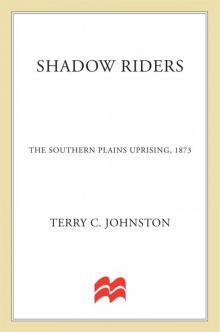 Shadow Riders: The Southern Plains Uprising, 1873 (The Plainsmen Series)
Shadow Riders: The Southern Plains Uprising, 1873 (The Plainsmen Series)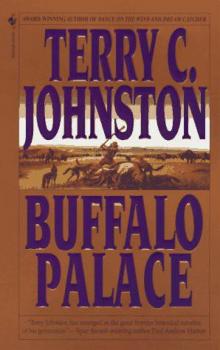 Buffalo Palace tb-2
Buffalo Palace tb-2 Cries from the Earth: The Outbreak Of the Nez Perce War and the Battle of White Bird Canyon June 17, 1877 (The Plainsmen Series)
Cries from the Earth: The Outbreak Of the Nez Perce War and the Battle of White Bird Canyon June 17, 1877 (The Plainsmen Series)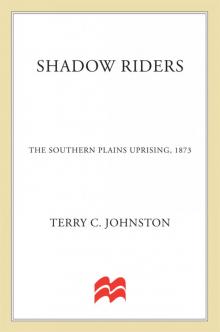 Shadow Riders, The Southern Plains Uprising, 1873
Shadow Riders, The Southern Plains Uprising, 1873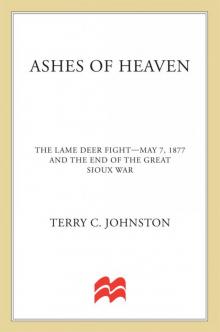 Ashes of Heaven (The Plainsmen Series)
Ashes of Heaven (The Plainsmen Series)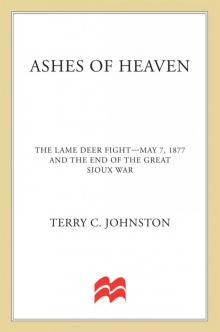 Ashes of Heaven
Ashes of Heaven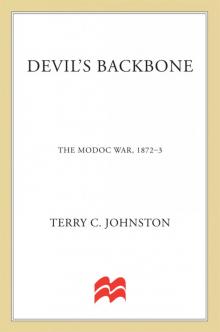 Devil's Backbone: The Modoc War, 1872-3
Devil's Backbone: The Modoc War, 1872-3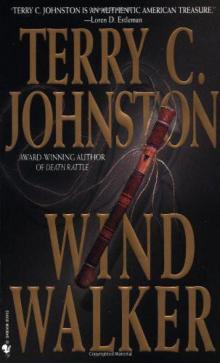 Wind Walker tb-9
Wind Walker tb-9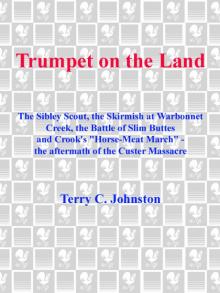 Trumpet on the Land
Trumpet on the Land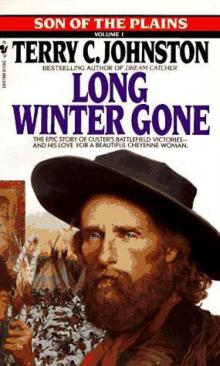 Long Winter Gone sotp-1
Long Winter Gone sotp-1 Dying Thunder
Dying Thunder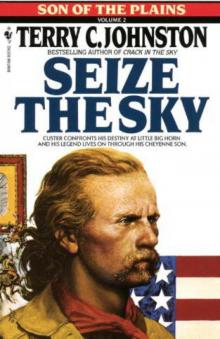 Seize the Sky sotp-2
Seize the Sky sotp-2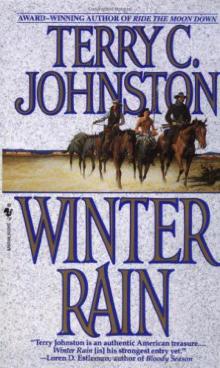 Winter Rain jh-2
Winter Rain jh-2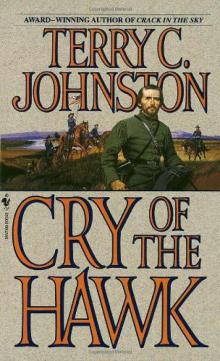 Cry of the Hawk jh-1
Cry of the Hawk jh-1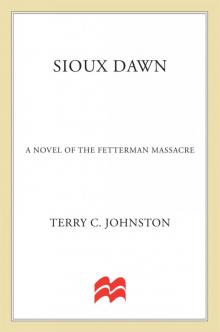 Sioux Dawn, The Fetterman Massacre, 1866
Sioux Dawn, The Fetterman Massacre, 1866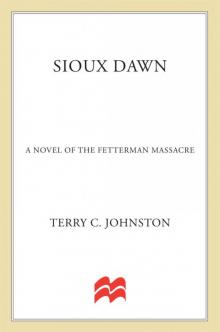 Sioux Dawn: The Fetterman Massacre, 1866 (The Plainsmen Series)
Sioux Dawn: The Fetterman Massacre, 1866 (The Plainsmen Series) Ride the Moon Down
Ride the Moon Down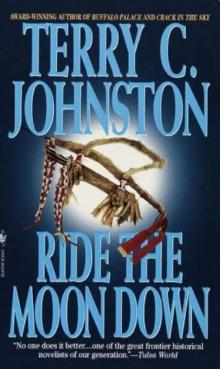 Ride the Moon Down tb-7
Ride the Moon Down tb-7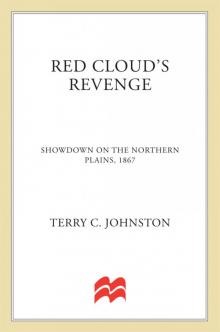 Red Cloud's Revenge
Red Cloud's Revenge Wind Walker
Wind Walker